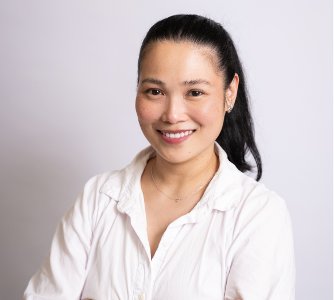Interview with Gillian Reyes-Marcelino
 | Gillian Reyes-Marcelino is a PhD student at the Daffodil Centre, a joint venture between the University of Sydney and Cancer Council NSW. Her research focuses on the external validation and evaluation of the First Primary Melanoma Risk Prediction Tool and the Subsequent Primary Melanoma Risk Prediction Tool, both available on the Melanoma Institute Australia website. She is supervised by Professor Anne Cust, Associate Professor Julia Steinberg, Dr Amelia Smit, Dr Caroline Watts, and Dr Yoon-Jung Kang. |
What experiences or background influenced your decision to pursue a PhD?
During my Bachelor’s degree in Marketing, my favourite subject was market research, which introduced me to the process of collecting and analysing data. My interest in preventative health led me to pursue a Master’s in Public Health, where I developed a strong foundation in epidemiology and health research. Wanting to further develop my skills in quantitative analysis, I decided to undertake a PhD to gain more experience in this area.
What is the focus of your PhD research?
My PhD focuses on melanoma risk assessment tools, specifically their external validation and how they are used in clinical practice. One of the key aspects of my research is evaluating the First Primary and Subsequent Primary Melanoma risk prediction models available on the Melanoma Institute Australia website to understand their accuracy and practical application.
What has been the most rewarding part of your PhD journey so far?
One of the most rewarding aspects of my PhD has been working alongside a team of researchers both within my centre and across Australia. I have received incredible support, and my colleagues have been generous with their time and guidance, providing me with numerous learning opportunities. Additionally, it has been personally fulfilling to pursue a PhD while raising two young children. I started my PhD when my eldest was three years old and recently returned from maternity leave after having my second child.
What challenges have you faced during your PhD, and how did you overcome them?
Although I enjoy working with quantitative data, it has also been the most challenging aspect of my PhD. One of my projects has involved a lot of back and forth with results, requiring me to troubleshoot issues and refine my approach to ensure accuracy. Learning how to navigate these challenges has been a valuable part of the research process.
What skills have you gained during your PhD that you didn’t expect to develop?
While I initially envisioned my PhD as being heavily quantitative, one of my projects involved a mixed-methods approach, which included interviewing participants. I hadn’t expected to enjoy qualitative research as much as I did, but I found the process of analysing and writing up qualitative data to be a rewarding experience.
Have you had the opportunity to collaborate with other researchers, locally or internationally?
I have had the opportunity to collaborate with researchers at the University of Queensland, which has been a great experience. I have learned a lot from working alongside them, and I continue to keep in touch with many of the people I have met during my PhD.
What’s one piece of advice you’ve received during your PhD that really stuck with you?
One piece of advice that has stuck with me is not to wait until a paper is perfect before sending it to my supervisors. They will always provide feedback and suggest revisions, so it is better to share a draft earlier in the process rather than delaying progress by trying to refine it on my own.



![apply now [source: istock]](https://acemid.centre.uq.edu.au/sites/default/files/styles/uq_core_small_square/public/ckfinder/images/iStock-857719502.jpg?itok=c9gXae_D)